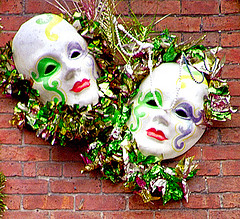 I often write about how important employees are as the ultimate brand advocates and ambassadors next to consumers. If your employees are treated well and truly believe in your company and your brand, then they’ll talk about it, and they’ll influence others. In the end, your sales will rise. But would your employees where Mardi Gras costumes, complete with beads, masks and more, for you?
I often write about how important employees are as the ultimate brand advocates and ambassadors next to consumers. If your employees are treated well and truly believe in your company and your brand, then they’ll talk about it, and they’ll influence others. In the end, your sales will rise. But would your employees where Mardi Gras costumes, complete with beads, masks and more, for you?
That’s what Harrah’s asked 2,000 employees to do at the company’s Showboat casino in Atlantic City, New Jersey as part of its new, corporate-wide “Everybody Plays a Part” program. The goal of the initiative is to make the consumer experience at Harrah’s casinos more social, and each Harrah’s property can implement the program as they choose — such as Showboat’s Mardi Gras festivities.
My question is this — would your employees willingly participate in similar activities? Or are they annoyed when they have to leave their desks for the obligatory company events? Would they wear Mardi Gras costumes for you?
Of course, Harrah’s operates a hospitality business, so entertaining is part of many of Harrah’s employees’ job descriptions, but do you think every employee was happy when they heard they’d have to wear Mardi Gras costumes? I don’t know the answer to that question, but it’s worth thinking about. Why? Because the key is to figure out how to make your employees want to participate in company events, dress in Mardi Gras costumes, and advocate the brand.
Bottom-line, if employees love the company, they’ll want to participate (okay, not all of them, but more than just a few). What do you need to do to get them to participate? That’s the key to creating employee brand advocates. First, you have to make them love the company and the brand, and then they’ll want to join in, support initiatives, and advocate the brand. It starts from the top down — make employees feel like they’re there for more than a paycheck 40+ hours per week.
What do you think?
Image: Flickr
Susan Gunelius is the author of 10 marketing, social media, branding, copywriting, and technology books, and she is President & CEO of KeySplash Creative, Inc., a marketing communications company. She also owns Women on Business, an award-wining blog for business women. She is a featured columnist for Entrepreneur.com and Forbes.com, and her marketing-related articles have appeared on websites such as MSNBC.com, BusinessWeek.com, TodayShow.com, and more.
She has over 20 years of experience in the marketing field having spent the first decade of her career directing marketing programs for some of the largest companies in the world, including divisions of AT&T and HSBC. Today, her clients include large and small companies around the world and household brands like Citigroup, Cox Communications, Intuit, and more. Susan is frequently interviewed about marketing and branding by television, radio, print, and online media organizations, and she speaks about these topics at events around the world. You can connect with her on Twitter, Facebook, LinkedIn, or Google+.

If there is a good relationship between employer/employee then it would be something that (if it makes sense, Like mardi gras for showboat does) I would imagine would be easy to do. Of course not only do they need a good relationship but also the employer needs to know how to approach and present such promotions that would require participation (hopefully enthusiastic) and also if the employer can help to make it easier and even more appealing, perhaps by providing some help (masks? Confetti?) or incentives (extra time, perhaps ten minutes to make-up or dress or a prize incentive).
Very interested article indeed. I myself is an owner of a Halloween costumes store and we too require our employees to dress up to play their part in Halloween. I believed it’s important for our business to show our customers that we are ‘into the spirits’ of Halloween. We have to sell that to them and without the wearing a costumes ‘Playing the part’ it will not be a convince.